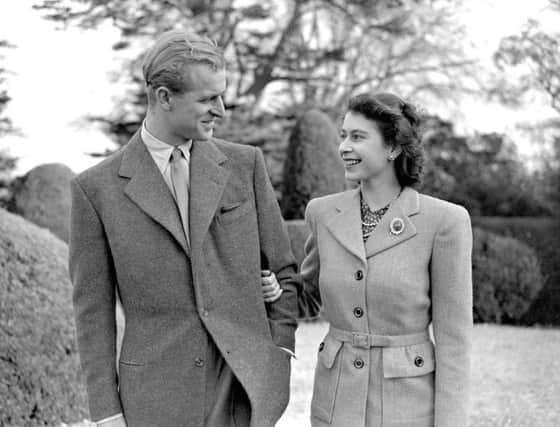End of the greatest royal double-act of our time


But with the announcement yesterday of the Duke of Edinburgh’s autumn retirement, the curtain fell on a royal double act that defined Britain in the post-war years and ever since.
It was a turn he carried off to perfection. “You’re about to see the world’s most experienced plaque-unveiler,” he had told the crowd just the day before, as he opened the new stand at Lord’s cricket ground.
Advertisement
Hide AdAdvertisement
Hide AdHe will be doing less of that in the future. “He is looking forward to enjoying more of his leisure time,” said an aide. Another pointed out that most people would have retired 30 years earlier.
He will retain his association with the 780 organisations he supports, but other members of the family will now step up to support the monarch.
Philip’s role, a deferential one step behind yet ready to lend a hand, was one for which he had known he was destined - yet it was a mantle he assumed much earlier than he had wanted.
The death of his father-in-law, George VI, in 1952, at just 56, ended any expectation of a low-profile royal life as a new parent. Instead, he would have to defer to his courtiers.
Advertisement
Hide AdAdvertisement
Hide AdYet there was no doubt within the royal household as to who wore the trousers. Philip was the head of the family, a modernising figure but an irascible character who said what he thought, no matter what the consequences
When, finally, he steps down, at 96, it will be as the longest-serving consort in British history.
Born in Corfu to Prince Andrew of Greece and Princess Alice of Battenburg, he had an uncommon relationship with Britain. His childhood was split between here and France, after his family went into exile following a military coup in Greece which overthrew his uncle, King Constantine I. His parents split up and he rarely saw either of them.
But during the Second World War, he served with distinction in the Royal Navy. While still a cadet, he caught the eye of the 13 year-old Princess Elizabeth - a distant cousin - when she visited the Britannia Royal Naval College with her parents, the King and Queen.
Advertisement
Hide AdAdvertisement
Hide AdOver the years their friendship grew, and in 1947, she married the dashing, blond Philip in Westminster Abbey.
He renounced his Greek title, became a naturalised British subject, and was made Duke of Edinburgh by the King.
That was where it went off-script. He had thought the extended honeymoon of a naval career split between London and the isle of Malta, where he was still stationed, would last for a decade or more. His wife’s accession to the throne changed all that.
In creating his new role as the first post-Victorian consort, he also defined the modern monarchy, accompanying the Queen around the world on Commonwealth tours and state visits and across the UK.
Advertisement
Hide AdAdvertisement
Hide AdAfter being told to keep out of the Queen’s official duties, he set about modernising Buckingham Palace, and reorganised the Balmoral and Sandringham estates, as well as becoming ranger of Windsor Great Park.
In 1956, he set up the Duke of Edinburgh’s Award, inspired by his time at Gordonstoun School in Morayshire. It has become one of the country’s best-known youth self-improvement programmes.
A symbol of continuity within the monarchy and public life, he has been the person the Queen relies upon above all others.
His first private secretary Michael Parker, a friend from the Navy, once revealed: “He told me the first day he offered me my job that his job, first, second and last was never to let her down.”